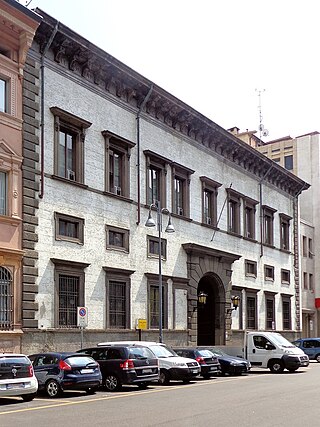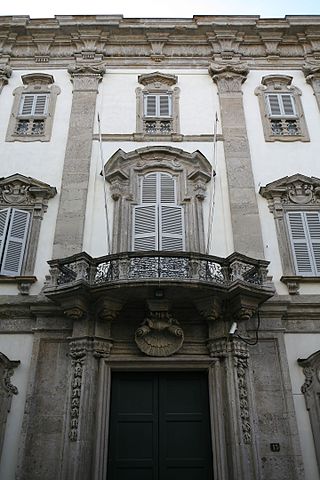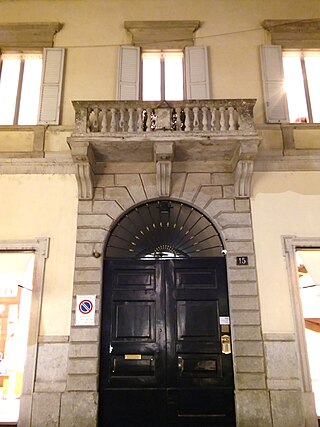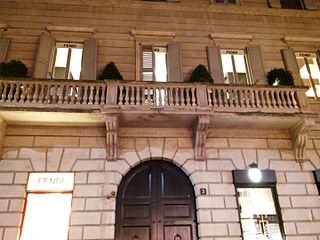
Villas and palaces in Milan are used to indicate public and private buildings in Milan of particular artistic and architectural value. Milan has always been an important centre with regard to the construction of historical villas and palaces, ranging from the Romanesque to the neo-Gothic, from Baroque to Rococo.

Piazza Cordusio is a square in central Milan, Italy. The piazza takes its name from the Cors Ducis which was located on the square during Longobard times. It is well known for its several turn-of-the-19th-century Neoclassical, eclectic and Art Nouveau buildings, banks and post offices. Even though many of these have now relocated elsewhere, it is still an important commercial square in the city and hosts the Palazzo delle Assicurazioni Generali, the Palazzo del Credito Italiano and the Palazzo delle Poste, former Borsa di Milano. Piazzale Cordusio hosts the Cordusio metro station and is the starting point of the elegant pedestrian Via Dante which leads to the imposing medieval Castello Sforzesco, or Milan Castle. Opposite to Via Dante, Cordusio borders onto Piazza Mercanti, former city centre in the Middle Ages, which leads directly to Piazza del Duomo, today's city centre.

The Palace of the Banca Commerciale Italiana is a historic building of Milan, Italy, located in Piazza della Scala, in the city centre. It was designed by architect Luca Beltrami in the early 20th century for Banca Commerciale Italiana, and it is still in use as a seat of the company. Since 2011 it hosts the Gallerie di Piazza Scala where are exposed many artworks from the collections of Fondazione Cariplo.

Casa Campanini is an art nouveau building in Milan, Italy, located at 11, Via Bellini. It was completed between 1903 and 1906 by architect Alfredo Campanini, who later inhabited the building.

Castello Cova, also known as Palazzo Viviani Cova is a landmark Neo-Gothic style residential and business building located on Via Giosuè Carducci #36, in central Milan, region of Lombardy, Italy. It is located some 100 meters west of the Basilica of Sant'Ambrogio. The building was designed by architect Adolfo Coppedè. Adolfo's career is also noted for designing the Casa del Fascio in Signa, and he was never shy to indulge in the appropriation of former styles and symbols; this building notable for its height and accumulation of Gothic architecture motifs such as a merlionated tower, peaked and rusticated ground-floor arches, and mullion-windows. It sports numerous decorated balconies on the facade.

Luigi Broggi was an Italian architect, Brera Academy alumnus and pupil of Camillo Boito, and later himself a professor at the Academy. He was mostly active in Milan; his most notable works include the Palazzo Broggi and the Palazzo del Credito Italiano, both in the central Piazza Cordusio, and the Magazzini Contratti building in the immediate surroundings. He also designed several villas in Lombardy, funerary monuments in the Monumental Cemetery in Milan and in the Pallanza cemetery, the Grand Hotel des Thermes at Salsomaggiore, and several hotels in Genoa.

The Palazzo Brentani is a monumental Neoclassical palace, located on Via Manzoni #6, in the centre of Milan, region of Lombardy, Italy. Both this palace and the adjacent Palazzo Anguissola Antona Traversi have sober academic facades, designed by Luigi Canonica in 1829.

The Palazzo Belgioioso is a palatial residence in the northern Italian city of Milan, completed in 1781 in a Neoclassical style by Giuseppe Piermarini.

The Palazzo Anguissola Antona Traversi is a palace located at Via Manzoni number 10, in central Milan, a city in the northern Italy. Construction began in 1778, and its Neoclassical facade, designed by Luigi Canonica, was added in 1829.

Casa Manzoni is a historical palace sited in via Morone 1 near the quadrilateral of fashion in the center of Milan, Italy. Owned by the Manzoni family, the house was the birthplace of the famous Italian writer Alessandro Manzoni in 1785.

Alessandro Mazzucotelli was an Italian craftsman, particularly known as a master ironworker and decorator. A specialist in wrought iron, Mazzucotelli linked his fame to the decorations of the works of the major exponents of Art Nouveau in Italy and abroad.

The Magazzini Contratti is a historic commercial building in Milan, Italy.

The Palazzo del Monte di Pietà is a 15th-century palazzo in Milan, Italy, adapted in a neoclassical style in the 18th century by Giuseppe Piermarini. Historically belonging to the Sestiere di Porta Nuova, it is located in Via Monte di Pietà no. 5, and was the seat of the Monte di Pietà di Milano.

The Palazzo di Prospero Visconti' is a 16th-century palace in Milan. Historically belonging to the sestiere di Porta Ticinese, it is located in via Lanzone 2, in the ancient contrada del Torchio no. 2,919.

Palazzo Isimbardi, also palazzo della Provincia, is a historic building in Milan located at 35 Corso Monforte, the seat of the Metropolitan City of Milan.

Palazzo Spinola is a 16th-century palazzo in Milan, heavily remodelled during the 19th century. Historically belonging to the sestiere di Porta Nuova, it is located at 10 Via San Paolo. Since 1808 it has been the seat of the Garden Society.

Palazzo Cusani is a 17th-century palace in Milano, remodelled a first time between 1712 and 1719 and a second time between 1775 and 1779. Historically belonging to the sestiere of Porta Nuova, it is located at via Brera 13–15.

Casa Crespi is a historic building in Milan located at 15 Via Sant’Andrea.

Palazzo Acerbi is a 17th-century palace in Milan in the Baroque style. Historically belonging to the sestiere di Porta Romana, the palace is located at corso di Porta Romana no. 3.

Palazzo Carcassola Grandi is a historical palace in Milan located at via Monte Napoleone 3.






















